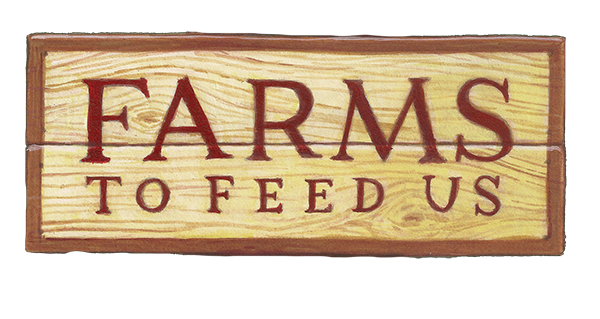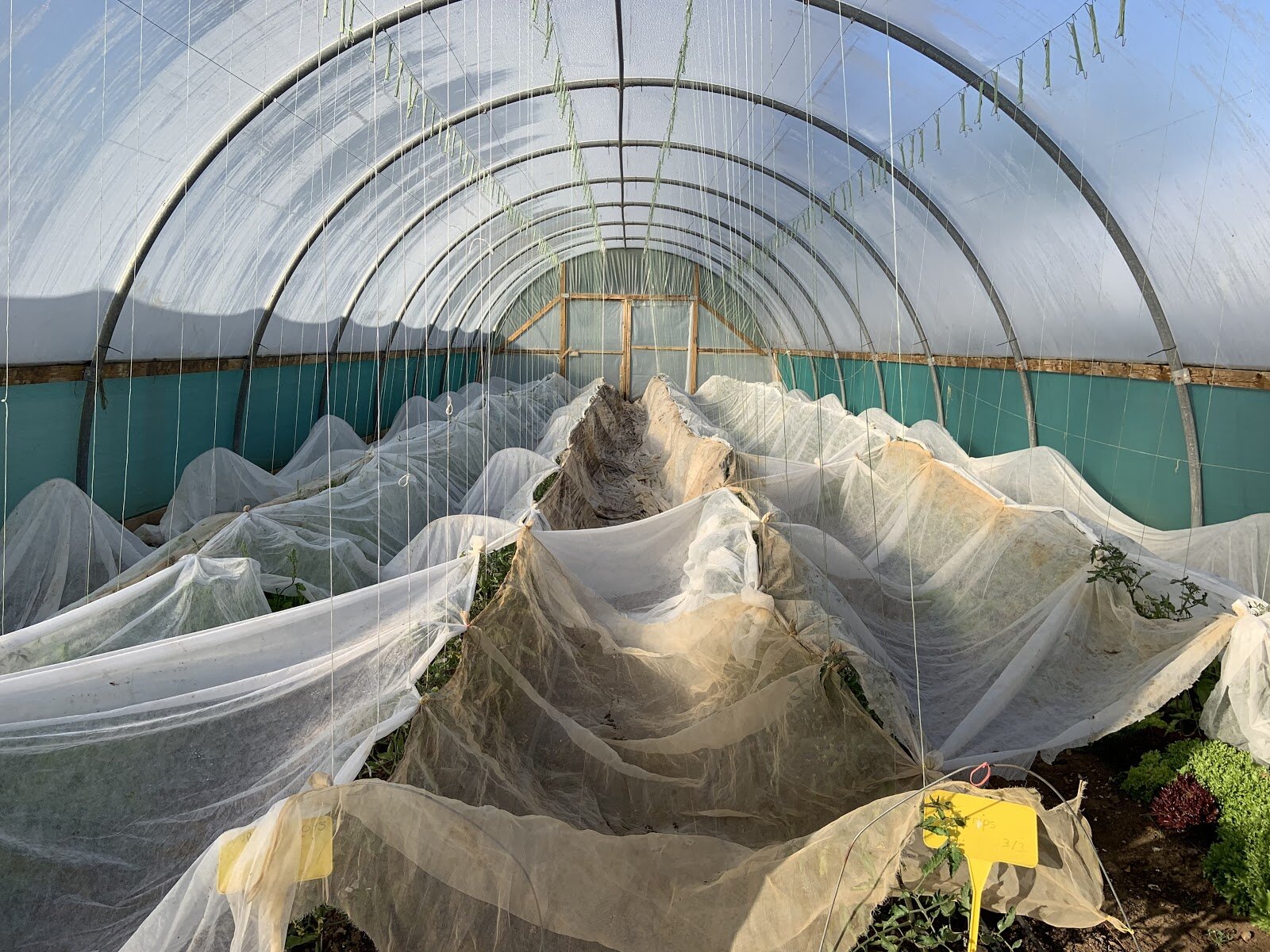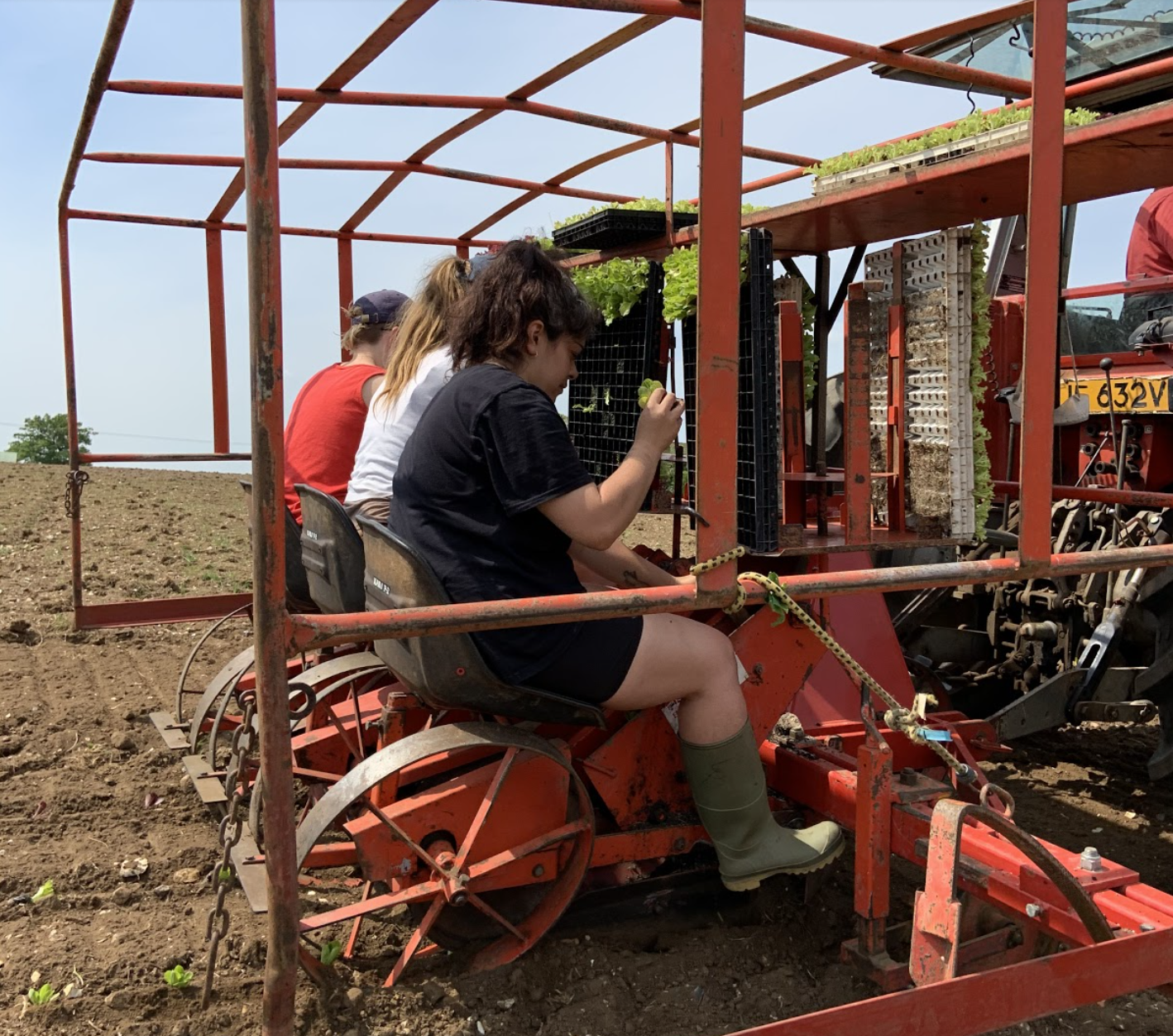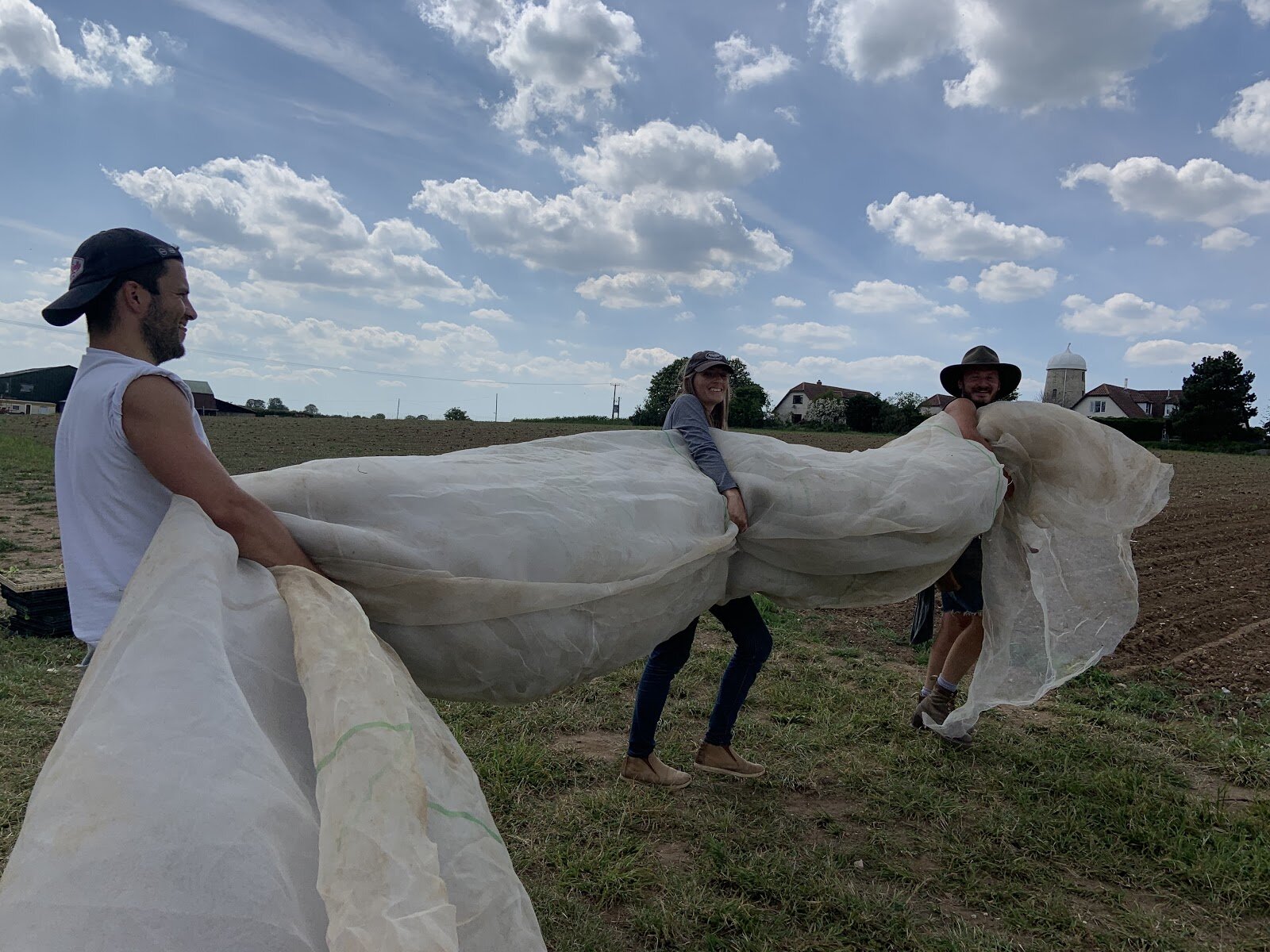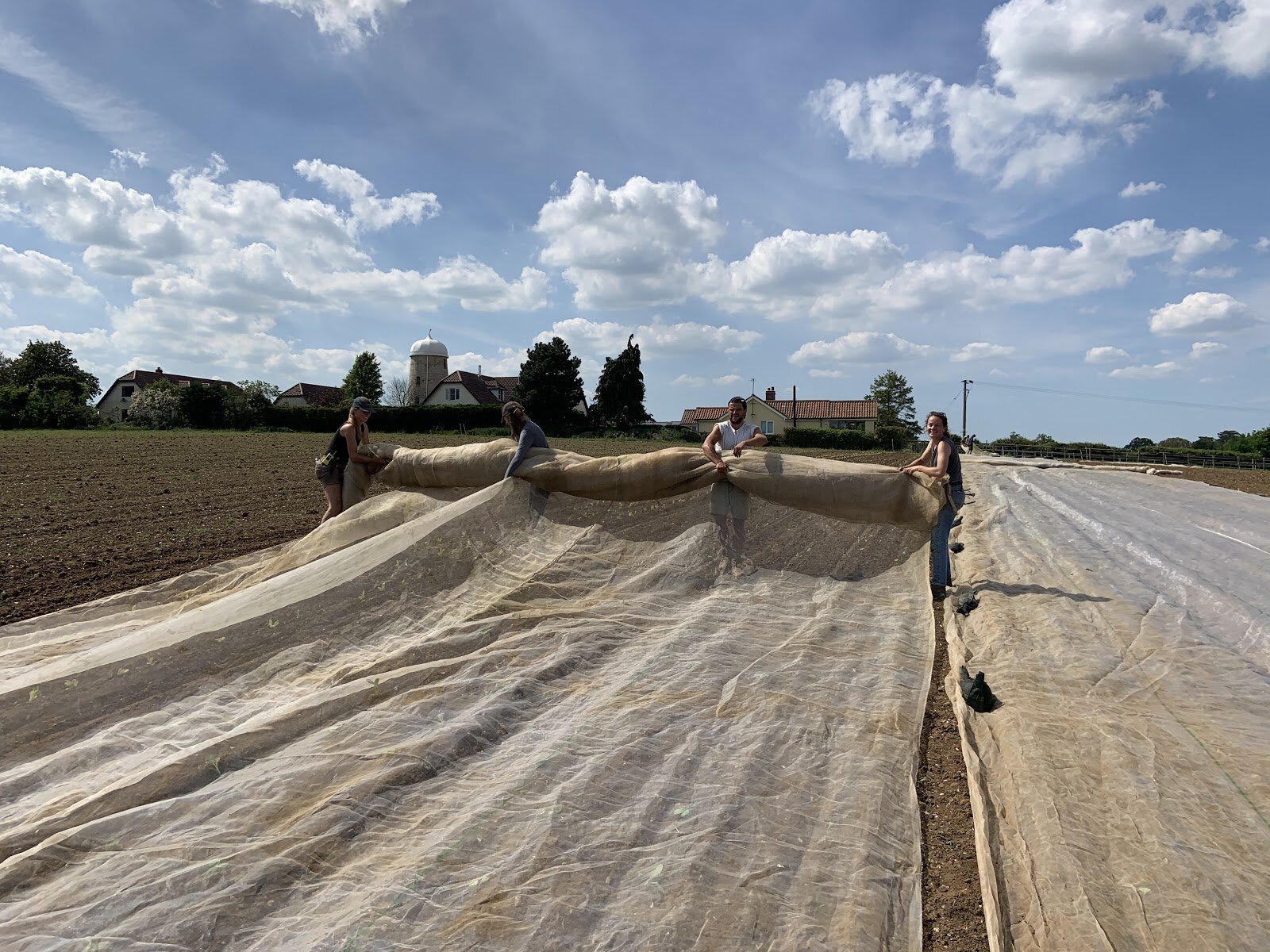Diary of a Flourishing Farmer
Lulu Cox went from the kitchen of Rochelle Canteen to the fields of Flourish Produce where she’s been volunteering during lockdown. She’s generously shared her diary for a week with us and also a couple of delicious recipes which you can find here – Broad Beans & Berkswell and Confit Wet Garlic & Goats Curd on Toast.
Introducing Lulu
My growing passion for regenerative farming drove me to leave my job as Sous-Chef at Rochelle Canteen and take on a voluntary role at Flourish farm. I’d made a plan prior to coronavirus to spend a full growing season working and learning as much as possible on regenerative farms. Between volunteering I’d hoped to do some pop up events & freelance work. The virus obviously unsettled this plan, but has allowed me to focus on exactly what I want to do, instead of what I might feel I should be doing.
I do miss the cooking but it’s wonderful to allow myself to be 100% focused on farming and for the foreseeable future, I feel driven by working with the land. I also grow flowers with my friends Liv and Jess, which we’re selling in East London through a business we recently set up – SSAW Collective. We aim for it to be a platform for other people who also want to work with nature, whether in art, food, flowers or farming. Through our website we will share resources and help connect people. Our monthly journal will be written by one of us or the community and in time we hope to host dinners, workshops, installations and much more!
As a chef, I want to work with ingredients that are produced in a way that will benefit the environment. I see soil health as an exciting answer to the colossal challenge our planet is faced with; we need to change our current food system and I want to help by spreading the word within the restaurant industry about the crucial link between chefs & environmentally-conscious suppliers.
I really believe chefs themselves should start to take on more responsibility. We all need to take ownership for making sure the food we source for customers is responsibly and sustainably farmed.
Flourish Produce is a highly respected 16-acre farm between Cambridge and London, run by Calixta. It produces high quality vegetables, salad leaves, herbs and flowers, which supplies restaurants and shops, such as Meadows & The Shelford Deli in Cambridge, and Brat, Smoking Goat and Westerns Laundry in London.
It’s mind-boggling that Flourish has only been running for 3 years – there’s been so much expansion. Since the Covid crisis hit, like many other farms, Calixta had to think quickly about how to survive; veg boxes and flowers are now available from collection points in Cambridge & London. Currently there are three full time members of staff, and twelve volunteers at Flourish. It’s all about teamwork and systematic approaches; working with the land, planning, efficiency, positivity & beauty.
A week at Flourish Farm
Monday 19th 2020
I’m into my 6th week volunteering at Flourish and it’s crazy how quickly it has gone! Originally I was only going to do 6 weeks, but I’m so pleased to be extending my stay, and hope to be here 3 days a week for at least a few more months, as for me it’s an invaluable learning experience.
My day starts at 6AM. After a quick shower and cup of tea, I check I have my Hori Hori, (digging knife) snips, gloves & suncream, and I’m off. It’s a 15 minute drive – every day I notice the traffic increasing. By 7AM I arrive at the farm for a quick briefing with the team and the managers explain the tasks for the day. Today, 3 amazing volunteers who have been on the farm for 3 months are off back home to Texas and France, so it’s an emotional goodbye.
Last week was a great week on the farm, a real eye opener to the realities of farming. The unexpected late frost has caused a bit of a nightmare… according to the weather report it was the coldest night in May for 40 years! So today we start by removing metal hoops & cloths from all of the crops which were vulnerable during last week’s frosts.
At Rochelle we always talked of ‘curve balls’ – unpredictable last minutes changes – and this late frost would definitely qualify! Last week, 6 people spent the first hour-and-a-half each morning unwrapping vulnerable crops from a frost-protective cloth & another hour in the evening tucking them up for the night. That’s 105 hours of work in total, all due to unprecedented weather – no one saw that coming!
By 8.30AM all of the hoops have been removed. We spend the next 15 minutes hooping up the peas, which need protecting from hungry pigeons… Fingers crossed they’ll make it. Now we’re onto a quick harvest of the wet garlic which is off to London in veg boxes the following day.
We were weeding here last week, and it’s amazing to see the difference in growth since then – you can see how those weeds steal the nutrients. Two people pick 90 wet garlic bulbs in 10 minutes and spend the next 20 minutes in the wash area, cleaning them with the power hose. Farming, like kitchens, is all about efficiency.
At 9AM it’s time for our 30min coffee break, which is a real winner. I’ve never had a job where I get to stop for coffee before, so it’s a real treat to take 30 minutes to enjoy a coffee, have a chat and get ready for the next half of the morning. Someone’s usually firing questions at Calixta about farm life, and, as always, she’s very willing to explain and share her knowledge.
From 09:30AM, we’re in the top field with a hoe each. It’s time to weed around the leeks, onions & chard. Two people take a row each, and we spend the next two and a half hours here, disturbing the seed bed & slaying weeds. Two people tackle a row together…
At noon we stop for lunch. Rupert has made a delicious turnip & coconut curry with fava beans & salad. Lunch is always vegetarian or vegan, and predominantly made from second selection produce or whatever is in abundance on the farm. A lot of pride goes into cooking for the team, which is awesome. It’s Will’s birthday, so there’s a carrot cake topped with a sparkler to go with our post-lunch coffee.
1PM-3PM is the last stint for the volunteers. Calixta radios for us to grab a tray of courgettes and head down to the field. This means planting time, AKA farming sportsday! The ability to work efficiently and quickly, and a ‘get on with it’ attitude is very similar to what is required in kitchens. Speed & efficiency are always needed, and there is never nothing to do… Never.
The soil is perfect for planting into, which is the result of Calixta’s skill as a regenerative farmer. Chris, the incredibly hard working and all-round great farm production manager, & Calixta work out the spacing and balance a tray of 126 courgettes on each of their shoulders. They’ve got a bed each. Us volunteers (there’s 5 of us in this instance) are ready behind them with our trowel (it’s secretively very competitive).
The aim of the game is: carefully get the courgettes standing tall in the ground, keep the lines straight, not too compact in the bed – and to do it as quickly as possible. It’s quite windy, and around 24 degrees. In twenty minutes we’ve planted 378 plants. Once that’s done, it’s time to run the irrigation pipe down in between the beds: I attach it to my back and walk / run unravelling the hose. It’s a real workout, but asking for assistance is not an option.
Tuesday 19th May
I start the day by harvesting flowers in polytunnel. The sweet peas must be 7ft tall now, and are definitely aiming for the roof. The calangala, forget-me-nots, nigella & cornflowers are all singing with happiness. There is so much life in here, the smell is insane!
Everything in here was destined for restaurants that use edible flowers, but now, Calixta has changed tack and we’re selling ‘bunches of flowers from the farm’ to the local community, along with the normal veg boxes. It’s been a wonderful element to the farm and perhaps a positive that’s come out of Coronavirus. I expect there’ll be more flowers grown here in future.
I notice the road outside the farm getting busier. It’s quite refreshing to know that so close to the sound of busy life and traffic, you can be somewhere that is so peaceful and humming with the sound of insects and nature.
I’m off to the pack room fridge with my buckets of flowers as deliveries are going off to London, so Calixta and I check and pack the van. I’m really appreciating being on the other side of deliveries, flashing back to being at Rochelle and checking orders. It’s fascinating to see it from the other side. Everything is labelled up and double-checked and by 11 o’clock, it’s all gone.
In the next hour, I help clear a bed in the triple-span polytunnel. Ladybird larvae were released here last week, so whilst clearing the bed we’re carefully making sure all the ladybirds remain. These carnivorous insects are a great organic pest control, their role is to eat the aphids. Right now this is essential as the aphids are going to town on the lettuce heads!
Lunch today is super tasty, followed by coffee outside in the sunshine. After the break there is a late flower delivery so I’m back in poly 5 cutting more flowers, whilst two of the guys are digging a trench to re-jig the irrigation. With all this sunshine the flowers have really shot up, and a lot needs deadheading. By the end of the afternoon, I’m back in the triple span to plant cucumbers. Suddenly it’s 3 o’clock and the end of our working day.
“I’ve learnt a lot about insects in the last few weeks, and the power of the ecosystems. At Flourish, being a regenerative farm when faced with a problem, answers are generally found by thinking about the food chain.”
Wednesday 20th May
I was a little tired this morning as I ended up pulling a late shift at my poly tunnel, picking flowers for SSAW Collective. One positive from the virus is we’ve had more time to focus on the poly, and as a result have an abundance of flowers.
Today is the first scorcher of the year! Back at the farm, Calixta announces “It’s going to be a huge planting day”, reminding us to keep hydrated. ‘Basically let’s just smash it out!’ We’re all behind her and can’t wait to get stuck in.
Life on the transplanter. It’s definitely one of the best jobs on the farm. Sitting on the back of the tractor, next to two other volunteers, cracking on with the planting, it feels pretty good. You have to concentrate – it’s a little like playing a video game, but 100 times more fun! The transplanter is also really effective, planting around 1000 plants in half an hour.
So much water is needed around the farm that it takes a lot of planning and organisation to make sure everything gets its supply. It’s hot and irrigation seems to be the biggest headache on the farm at the moment. I liken it to struggling for oven space in a busy kitchen. Everything needs to get cooked, but it can’t all be done at the same time, so it’s a matter of prioritising.
Our last job of the day is to protect what we’ve just planted from the birds, by covering the crops with a huge nylon cloth. This job benefits from many pairs of hands – around half of all the volunteers get stuck in.
The space we are covering here is about 100m long and 10m wide. Generally, 3 times a week we’re either putting on or taking off protective cloth. It is hard work, but rewarding. My arms are feeling the burn.
Thursday 21st May
Today we have a day at Johns, a local farm where Calixta rents a half acre poly tunnel, with 42 beds. This means a day of planting, with a picnic lunch. So much has changed in this poly since I started. When Calixta started renting this plot a year ago her first move was to sew the entire site in a cover crop, and just one sewing has helped a lot.
Farmer Fabs, the produce manager, looks after this site (it’s his baby), managing a team of 4. His attention to detail and systematic approach is definitely paying off. The soil here is totally different to that at the farm. Here it is clay, and it is not the easiest to work with.
We’re in the middle of a planting marathon. Come July, this place is going to turn into a pepper jungle! I never knew, or took time to appreciate, how many amazing vegetable varieties are out there. It’s a huge part of life at this farm, it makes so much sense, I just hadn’t considered it before.
Chefs love unusual ingredients and Calixta really is growing such a vast array of specialist varieties. It sets farms (and restaurants) apart. Growers & chefs who use more unique ingredients definitely have an edge on the industries. With such a host of rare and incredibly niche varieties, it’s no wonder there’s a waiting list for restaurants to get onto Flourish’s books.
The first part of planting starts with bed prep. The previous crop is cleared, all roots & weeds are removed, and then comes the mighty broad fork. Which is a real workout, and a determination game. (Basically don’t look round until you’re nearly done!) The broad fork helps aerate the soil, as well as allowing manure & compost, aka nutrients, to leach down the cracks, without turning the soil.
Once aerated, the bed is carefully marked out by Farmer Fabs, and the plants are lined out. Straight lines, as ever, are very important, as is equal spacing between plants. Three chicken manure pellets & a hand full of compost go into the dug hole and the plant is carefully placed in and secured. It takes your body a while to adapt to different crouching positions, and it’s pretty hot in here, but none-the-less, a really enjoyable task.
Friday 22nd May
Fingers are all crossed that next week’s hot weather isn’t going to affect our sweet peas too much. This wind is also making me a little nervous, poor little sunflowers.
Two new volunteers, who also work in the hospitality industry, arrived at Flourish last night. They’re front of house at Lyle’s and Brawn. It’s really cool that so many industry people are here volunteering. I’ve met people from Primeur, Brawn, Somsaa, Lyles, Shepherds and St. John. It gives me hope that the London restaurant scene is building a stronger link and deeper understanding to regenerative farming.
I spent most of my morning harvesting and then deadheading flowers. The maintenance of everything has really ramped up as we get closer to summer. Rosie and I build the trellis extension with hazel branches and attach it to the roof. It’s a fun project, requiring dexterity and patience.
Whilst we’re working we talk about how much we are enjoying being on the farm and how great it would be if more people had the opportunity to do so. Working with the soil, and plants and being outside is so good for our mental health, I wish more people could experience it – more people need to know about WWOOFING!
Friday is clean up day, everybody is allocated different housekeeping. I’m in the kitchen, and my jobs take a good hour. After that I’m off to the top field to harvest my broad beans and wet garlic for the recipes I’m going to share with you.
